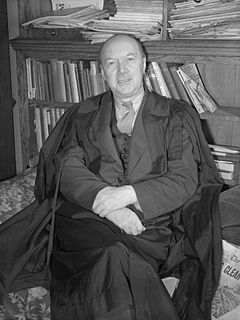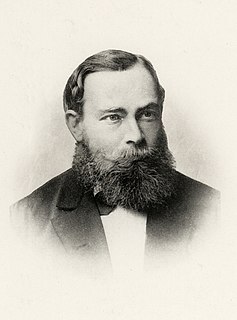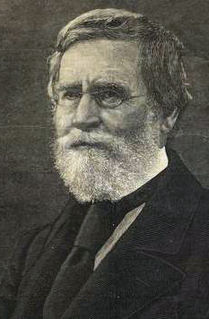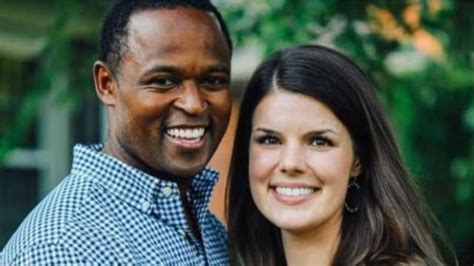A Quote by Mark Twain
That is the way of the scientist. He will spend thirty years in building up a mountain range of facts with the intent to prove a certain theory; then he is so happy with his achievement that as a rule he overlooks the main chief fact of all-that all his accumulation proves an entirely different thing.
Related Quotes
The mark of an educated man is not in his boast that he has built his mountain of facts and has stood on top of it, but in his admission that there may be other peaks in the same range with men on top of them, and that, though their views of the landscape may be different from his, they are none the less legitimate.
'Facts, facts, facts,' cries the scientist if he wants to emphasize the necessity of a firm foundation for science. What is a fact? A fact is a thought that is true. But the scientist will surely not recognize something which depends on men's varying states of mind to be the firm foundation of science.
Facts matter not at all. Perception is everything. It's certainty. People love the president because he's certain of his choices as a leader, even if the facts that back him up don't seem to exist. It's the fact that he's certain that is very appealing to a certain section of the country. I really feel a dichotomy in the American populace. What is important? What you want to be true, or what is true?
I saw Pastor Bonhoeffer, before taking off his prison garb, kneeling on the floor praying fervently to his God. I was most deeply moved by the way this lovable man prayed, so devout and so certain that God heard his prayer. At the place of execution, he again said a prayer and then climbed the steps to the gallows, brave and composed. His death ensued in a few seconds. In the almost 50 years that I have worked as a doctor, I have hardly ever seen a man die so entirely submissive to the will of God.
The truly educated man is not a man who knows a bit of everything, not even the man who knows all the details of all subjects (if such a thing were possible): the “whole man” in fact, may have little detailed knowledge of facts and theories...but he will be truly in touch with the centre. He will not be in doubt about his basic convictions, about his view on the meaning and purpose of his life. He may not be able to explain these matters in words, but the conduct of his life will show a certain sureness of touch which stems from this inner clarity.
[The scientist] believes passionately in facts, in measured facts. He believes there are no bad facts, that all facts are good facts, though they may be facts about bad things, and his intellectual satisfaction can come only from the acquisition of accurately known facts, from their organization into a body of knowledge, in which the inter-relationship of the measured facts is the dominant consideration.
Keep children as much as possible by themselves ... keep them from company, good or bad. ... It will be generally found that the most virtuous and the most intellectual, are those who have been brought up with few companions. ... in fact his mental resources may be considered entirely unknown and unexplored, who cannot spend his best and happiest hours alone.
The man who will go where his colors go, without asking, who will fight a phantom foe in the jungle and mountain range, without counting, and who will suffer and die in the midst of incredible hardship, without complaint, is still what he has always been, from Imperial Rome to sceptered Britain to democratic America. He is the stuff of which legions are made. His pride is in his colors and his regiment, his training hard and thorough and coldly realistic, to fit him for what he must face and his obedience is to his orders. He has been called United States Marine.
We've long known that firms can pay higher wages if they spend less on workplace safety enhancement. Libertarians ask, "If a worker is willing to accept higher wages in return for his agreement to exercise greater caution while performing his job, why should the government prevent him from making that choice?" It's a rhetorically powerful question, yet it overlooks the fact that the agreement in question will have adverse effects on others.
It often seems to me that's all detective work is, wiping out your false starts and beginning again." Yes, it is very true, that. And it is just what some people will not do. They conceive a certain theory, and everything has to fit into that theory. If one little fact will not fit it, they throw it aside. But it is always the facts that will not fit in that are significant.
Such is professional jealousy; a scientist will never show any kindness for a theory which he did not start himself. There is no feeling of brotherhood among these people. Indeed, they always resent it when I call them brother. To show how far their ungenerosity can carry them, I will state that I offered to let Prof. H--y publish my great theory as his own discovery; I even begged him to do it; I even proposed to print it myself as his theory. Instead of thanking me, he said that if I tried to fasten that theory on him he would sue me for slander.
The native American has been generally despised by his white conquerors for his poverty and simplicity. They forget, perhaps, that his religion forbade the accumulation of wealth and the enjoyment of luxury... Furthermore, it was the rule of his life to share the fruits of his skill and success with his less fortunate brothers. Thus he kept his spirit free from the clog of pride, cupidity, or envy, and carried out, as he believed, the divine decree-a matter profoundly important to him.




































